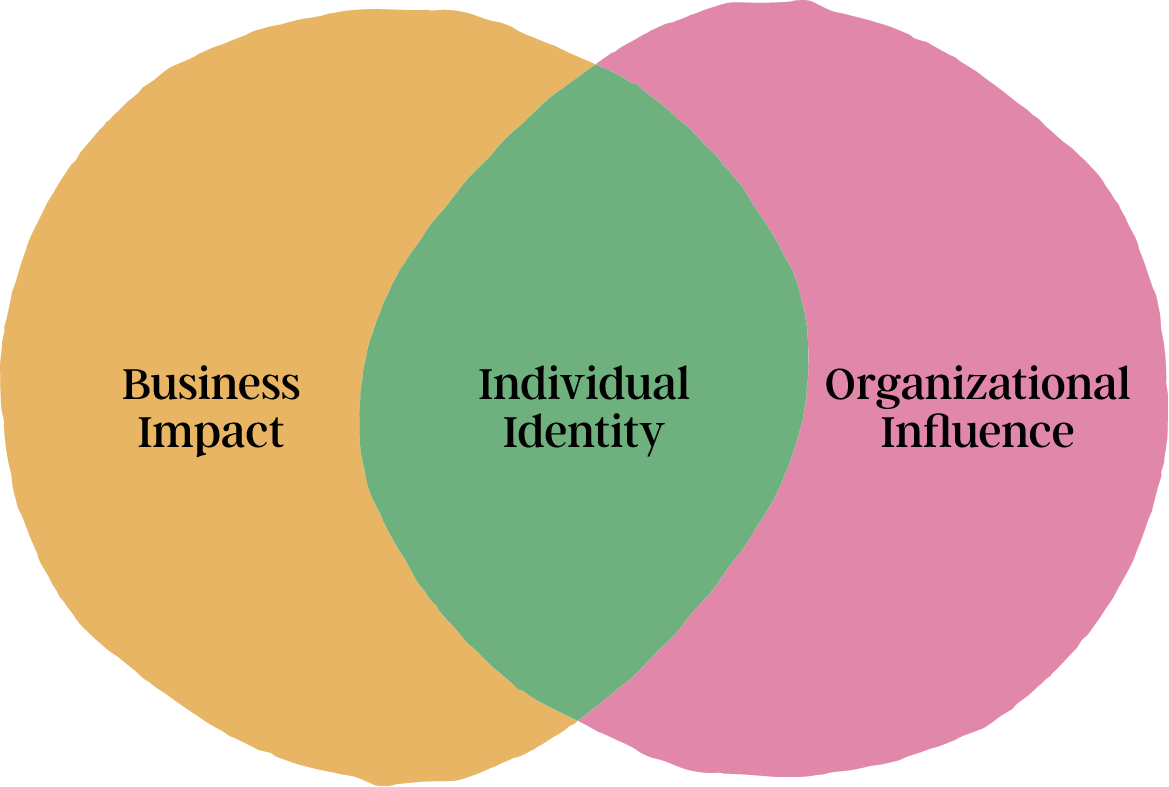
This graduate-level learning series, introduces Design Thinking, Behavior Design and Game Design principles and practices to broaden creativity and innovative thinking. The curriculum focuses on the problem-solving methods pioneered by Stanford University and adopted by some of the world’s leading global tech and multinational corporations.

The Driving Innovation by Design curriculum encourages participants’ self-expression to deliver bold and nuanced approaches. Participants learn how to challenge assumptions, influence outcomes and take advantage of their under-utilized capabilities—skills required in every leader today.
The instruction and course content are customized to foster a sense of purpose, community, and accomplishment through shared learning. Our focus on identity allows us to approach new skills from the learners’ culture and social experience, so participants can easily apply their knowledge to their every day work life.

Ultimately, Driving Innovation by Design will help prepare participants for the emerging market opportunities ahead, whilst empowering participants to drive more meaningful change within themselves, their teams, and the business at large.
At the completion of the course, participants will return to their organizations with a deeper understanding of how to increase the probability of success in the new marketing landscape.
This program is designed to provide foundational skills to successfully navigate this increasingly volatile era of transformation. In this session participants will be introduced to personal and business outcomes, topics, and tools that will be discussed over the 4 weeks to expand theoretical concepts to practical application.
Behavior Design addresses the science of moving people to action. Pioneered by Dr. BJ Fogg at Stanford University, Behavior Design takes a testable, systematic approach to behavior change using an overarching model of Behavior = Motivation, Ability, and Prompts. In this session participants will learn how Behavior Design helps us understand the psychology that enables or inhibits people from taking action. Persuasive technology is the means to prompt a specific behavior, enable it and measure its effectiveness. Behavior Design and persuasive technology work hand in hand.
Design Thinking is a conceptual and analytical process of generating solutions in four phases: inspiration, empathy, ideation, and prototyping. This process takes an idea through preliminary research, structuring an idea and building and testing prototyes. The success or failure of the prototype creates data that guides further prototype improvement leading to a product launch.
We often feel powerless, but actually have more power than we tend to believe. That is because power resides in every relationship due to the roles we play in others’ lives. Though we think power emanates from status or hierarchy, it’s really about how much we are needed, and how we fulfill our responsibilities. The best use of power is not for self-enhancement. It’s how you participate in someone else’s story. Melissa Jones Briggs will demonstrate how we can harness our personal power by adopting a performer’s mindset.
Game Design Thinking is the intersection between Game Design, Behavior Design, and Neuroscience. It speaks not only to the extrinsic, or surface, motivation that we find with many instances of gamification, but also drives towards the intrinsic, or internal motivation that drives all of us. This intrinsic motivation is the critical piece that helps us match our product goals to those of our customers. In this session, Chris Bennett discusses MDAO, a framework that helps us design for emotion which drive outcomes.
The human psyche responds reflexively and spontaneously to stimulus systems. Participants will be familiarized with initiation prompts, core loops, engagement journey, Compulsion Cycles and innovation equation. The Core Engagement Loop is a foundational construct of Game Design Thinking that drives our attention hundreds of times a day.
Having a potent solutions tool kit is essential for many reasons. First, strong solution skills effectively lower anxiety, support successful leadership traits and allow more remarkable foresight, and confidence. In addition, decreased pressure also fosters receptivity to more and diverse input. In this session, Margarita Quihuis will review Behavior Design methods to logically approach any circumstance that requires one to act.
This program guides participants to a deeper appreciation of character strengths in themselves and their teams, to succeed with greater ease, freedom, and satisfaction. In this session, Wendy Richards discusses the Four “Ps” of Power and Balance Polarities and shares her experience as one of Fortune’s “Top 50 Most Powerful Women in Business in Europe.”
This session will provide a review of the diverse strategies introduced during the course along with discovering new techniques to resolve marketing challenges. Topics covered will include applications of the Adoption Curve for marketers and brainstorming best practices to optimize the solution process.
Weekly hands-on workshops offer real world application of learned concepts. The team collaboration on Microsoft business cases allows participants to utilize new organizational and communication leadership building behaviors and skills.

Apply key frameworks to unmet Microsoft business challenges.
Share in curated lectures led by Stanford University instructors.
Gain additional insight from instructor handouts and reading lists.
Give and receive feedback from peers, instructors and Microsoft leaders.
Exchange best practices and brainstorm with a diverse group of Microsoft marketers.
Discuss challenges and solutions with knowledgeable experts.

Michael’s cross-industry career evolved through three different professional environments: traditional large corporations, entrepreneurial start-ups (including two successful self-initiated start-ups), and management consulting. His experience includes work in marketing, distribution, business and program development, product management, and as an Executive in entertainment and technology industries including Columbia Records, HBO, Sony Pictures Entertainment, and SanDisk. More recently, he served as the President of the Board of Directors of The Stanford Graduate School of Business Alumni Association and currently is the Business Director for the Peace Innovation Lab at Stanford. Michael is trained in Design Thinking (Stanford D. School) and Behavior Design (Certification Level-BJ Fogg, Stanford).


Wendy Richards builds organizational agility by aligning corporate strategy and global leadership, serving teams across multiple industry verticals. As Executive Leadership Coach to PE-backed companies, she draws upon her record of success as Chief Marketing Officer for premier investment managers including Makena Capital. Multi-lingual and multi-cultural in experience and approach, Wendy serves as Member of the Board of a leading family-held European corporation, an industry leader in Sustainability. An experienced McKinsey strategist and Stanford Graduate School of Business Executive Challenge judge, Wendy was honored in Fortune’s “Top 50 Most Powerful Women in Business in Europe.”

Passionate about breaking down barriers to advancement for underrepresented leaders, Melissa works with emerging and established industry trailblazers to examine how behavior impacts everyday personal and business interaction. She designs and directs global leadership and coaching programs for top corporations and hyper-growth startups, NGOs, and national institutions. She also teaches and researches performing arts as a tool for social and organizational change as a Stanford Graduate School of Business lecturer and Oxford University Associate Fellow.

Margarita Quihuis is a Stanford trained expert in Behavior Design under BJ Fogg, founder of PeaceX Ventures, CEO of The Peace Institute at The Hague and Executive Director at the Peace Innovation Lab at Stanford University, which is affiliated with the Stanford Graduate School of Business. Her courses in Behavior Design, customer experience, trust building, and peace innovation have been offered at the Stanford D. School and to visiting executives in the transportation, finance, media, and energy sectors. She is a published author on tech ethics and is one of the world’s leading experts on peace innovation, peace engineering and peace finance.

Chris Bennett specializes in innovation, engagement, and motivation design as an award-winning Game Designer and Stanford adjunct lecturer. He has over 20 years of experience in the entertainment software industry, including three very successful franchises; The Sims, Diner Dash, and Tiger Woods PGA Tour. Chris is skilled at the science of game design in consumer and social products for increased user engagement, retention, and monetization and crafting a compelling user experience through core engagement loops and narrative storytelling.
We are the top performing change makers from leading global marketing firms joined together to form a creator company that’s redefining agency. Maude Institute is our dedicated practice to solving learning gaps that prevent wide-scale innovation and creative solutions. We leverage modern methods, rooted in behavior science, to drive higher value outcomes for marketers and their brands.